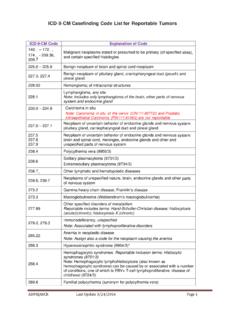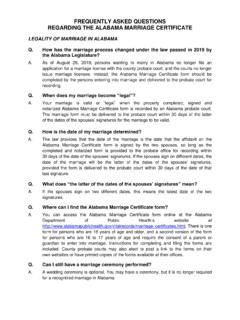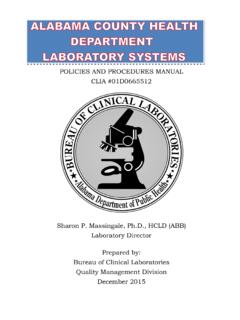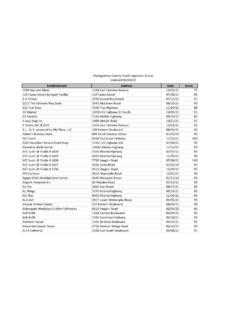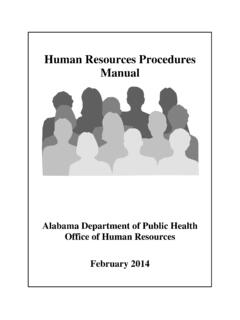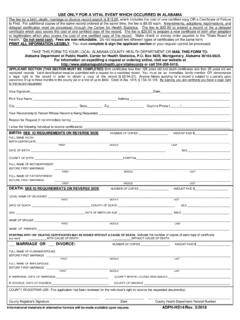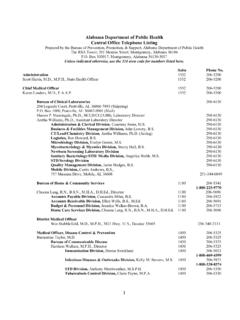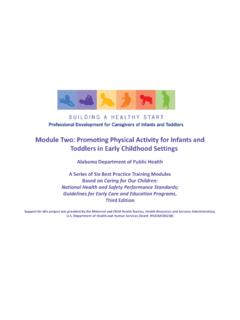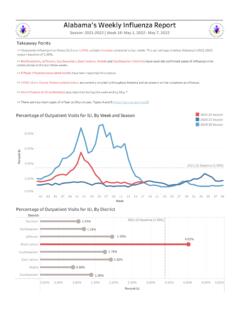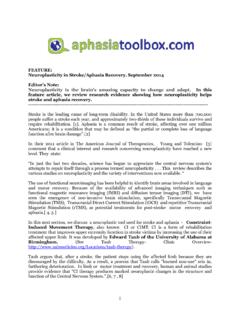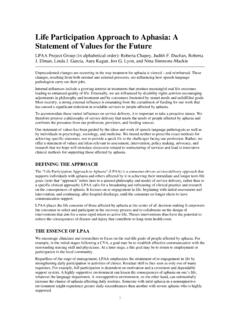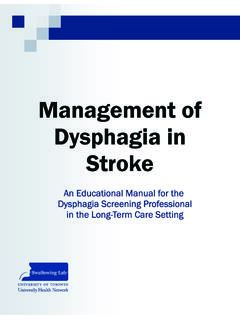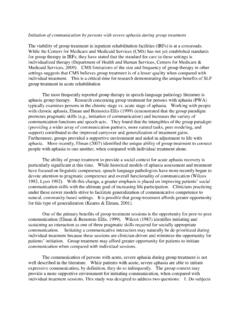Transcription of Practical Tips on Faculty Management of Patients with ...
1 1 Practical Tips onManagement of Patientswith Dementia in the HomeSatellite Conference and Live WebcastWednesday, May 16, 20072:00 - 4:00 (Central Time)Produced by the Alabama Department of Public HealthVideo Communications and Distance Learning DivisionFacultyRichard E. Powers, MDMedical DirectorandDirectorBureau of Geriatric PsychiatryAlabama Department of Mental Health andMental RetardationAssociate Professor of PathologyDivision of NeuropathologySchool of MedicineUniversity of Alabama BirminghamProgram Objectives Explain the meaning of dementia. Outline common intellectualsymptoms of elders with dementiawho live at home. Explain the role of medications inslowing deterioration and improvingbehavior. Discuss common causes ofagitation, screaming, wandering, andaggressive Objectives Explain the role of redirection andvalidation in caring for persons withdementia. Explain the meaning of depression,hallucinations, and delusions.
2 Describe common delusions thatmay be expressed to a homehealthcare Objectives Discuss common reasons whypeople with dementia begin to loseweight. Identify important ethnic healthcaredifferences for Three D s Of GeriatricNeuropsychiatry Dementia Delirium Depression2 Dementia Origin: de mens (Out of mind) Definition: Loss of multipleintellectual functions in awake Origin: de lira (Out of the furrow) Definition: Temporary confusioncaused by medical or Of Delirium InThe Elderly Up to 50% on psychiatric wards Up to 30% in ICU Up to 15% in general medical unitSymptoms Of Delirium Consciousness Cognition Psychiatric Motor AutonomicSymptoms of Delirium Abrupt onset Fluctuating symptoms Short duration Patient to patient variabilityComparison ofDementia and DeliriumDementiaDeliriumOnsetDurationSym ptomFluctuationConsciousnessSlowAbruptYe arsDays toWeeksRegularIrregularIntactImpaired3 Causes of Delirium in theElderly Medications Infections Metabolic abnormality HypoxiaDrugs and Delirium Common.
3 Anticholinergic agents (Elavil) Benzodiazepines (Valium) Pain medications (Demerol) Less common: Antispasmodics AntiarrhythmicsOver-The-CounterMedicatio ns And Delirium Sleeping medications Antihistamines Cold preparations AlcoholNursing Assessment ofDelirium Complete vital signs I & O Medication assessment Review of flow sheets Examination of lab values One week review of nursing notesManagement of Delirium Treatment Treat infection or medical problem Stop medications Maximize sensory function Hydration Improve bowel function Low dose neurolepticsIncidence Of Depression InThe Elderly 7-10% general population 40-50% post stroke 20-40% chronically medically ill 25-40% dementia4 Symptoms of GeriatricDepression SSleep IInterest GGuilt EEnergy CConcentration AAppetite PPsychomotor Vitality SSuicidePseudo-Dementia A Dementia-like syndrome caused in the Elderly Among top ten causes of death Lethal attempts Many seek medical carePatient Outcome FollowingTreatment Of Depression WithTricyclic Antidepressants 2/3 improve with
4 Medication. 1/3 improve with placebo. Few melancholic depressionsimprove with Dictionary Dementia Cognitive Mental retardation Organic brain syndromeFour Common Causes ofDementia Alzheimer s Disease60% Vascular Dementia20% Alcoholic Dementia2-10% Diffuse Lewy Body Disease2-10%5 Prevalence of Dementia 10% over age 65 47% over age 85 No racial differencesCognitive Symptoms No pattern of intellectual loss isspecific for any disease. The pattern of loss differs for eachperson. The speed of loss is variable. Cognitive loss is cumulative of Dementia Cognitive deficits Psychiatric symptomsFour A s Of Alzheimer s Amnesia aphasia Apraxia AgnosiaAmnesia The inability to remember facts orevents. Recent Memory - ( , what you atefor breakfast). Remote Memory - ( , theappearance of your childhoodhome).6 aphasia Inability to understand orcommunicate with spoken or writtenword. Left Side Words andgrammar Right Side Emotionalquality Musical quality CursingExpressive FunctionsChannels of HumanCommunication Meaning of words Tone of voice Body language Facial expressionReceptive aphasia Inability to understand spoken aphasia Inability to communicate with Inability to do pre-programmedmotor tasks ( , button a shirt, tieshoes).
5 7 Agnosia Inability to recognize previouslylearned sensory input ( , the faceof your child or the shape of a carkey).Alzheimer s Stages Early 2 - 5 Years Middle 3 - 5 Years Late 5 - 10 YearsAlzheimer s Body No physical damage Brain Only organ damagedUnderstanding the Diseasethat Kills the Brain withDementia: Looking Under theMicroscopeThe Impact of Heavy Drinkingon the BrainCommon NeurologicalSymptoms of Alcoholism Memory problems Falls Numb feet8 Predictors of PsychiatricSymptoms Age of onset Premorbid psychiatric diseasePsychiatric Disorders inDementia Thought Mood BehaviorDisorders of Thought Hallucinations Delusions ParanoiaHallucinations in Dementia 25% incidence Auditory or visual Increased risk with sensoryimpairment Common in middle stagesDifferential Diagnosis ofHallucinations in Dementia Delirium Depression Sensory impairment Hypnogogic hallucinationsTreatment of Hallucinations inDementia Maximize sensory function Reassure patient Antipsychotic medications Other medications9 Indications for AntipsychoticTherapy of Hallucinations Patient distress Dangerous patient response Caregiver safetyDelusions 25% - 40% incidence Common in middle stage Distressing to caregiversCommon Delusions Life circumstances Stealing Infidelity
6 AbuseDifferential Diagnosis ofDelusions Delirium Depression Cognitive dysfunction Accusations are correctManagement of Delusionswith Dementia Redirection and distraction Reassurance Antipsychotic medicationsBehavioral Problems Stage of dementia Medical problems Premorbid function Environment10 Behavioral Disturbances42%36%Apathy /Withdrawal7%8%SexualDisinhibition45%36% Rages48%47%UrinaryIncontinence21%19%Wand ering14%40%AggressionFemaleMaleAggressio n Dementia Mild Moderate Severe Prevalence 8% 17% 24%Wandering Dementia Mild Moderate Severe Prevalence 0 10% 27%Common Reasons thatDemented Patients BecomeRestless Fear Hunger Fatigue Frustration PainSafety Issues Firearms Dangerous instruments ( , knives) Dangerous equipment ( , stoves) AutomobilesMisidentification of Caregiver Causes Agnosia Delusions Intervention /treatment Tolerance Antipsychoticmedications11 Poor Hygiene Causes Apraxia aphasia Psychosis Intervention /treatment ADL assistance Non-verbalcommunication AntipsychoticmedicationWandering Causes Disorientation Anxiety/boredom Urinary/fecalurgency Hunger Rectal impaction Intervention/treatment Recreationalactivities Recreationalactivities Toileting schedule Frequent feedings DisimpactImportant Considerations forDietary Service and Dementia Presentation of food Food consistency/texture Utensils Entree selection Frequency of feedings Dining room environmentCauses Intervention/treatment DisorientationReorientation DelusionAntipsychotics HungerFeed Patient PainAnalgesics AphasiaNon-Verbal Communication DeliriumSee Delirium Fact Sheet FearReassurance FatigueNaps Rectal ImpactionDisimpact Sensory Impairment Check Vision and HearingVerbal or
7 Physical ThreatsIncontinenceCauses Interventions/treatment DisorientationToileting Schedule UTIT reat UTI MedicationChange Medication GU ProblemUrology Consultation DeliriumSee Delirium Fact Sheet Rectal Impaction DisimpactDisrobingCauses Interventions/treatment AmnesiaRecreational Activities ApraxiaJumpsuits AnxietyRecreational Activities DeliriumSee Delirium Fact Sheet BoredomRecreational Activities12 Screamers 25% of residents scream four timesper week. Associated with dementia,depression, isolation and poor ADLfunction. More screaming with social Management Treat underlying cause ( , pain,depression) Reduce isolation Tolerance by staffSnack em or Nap emdon tZap em
